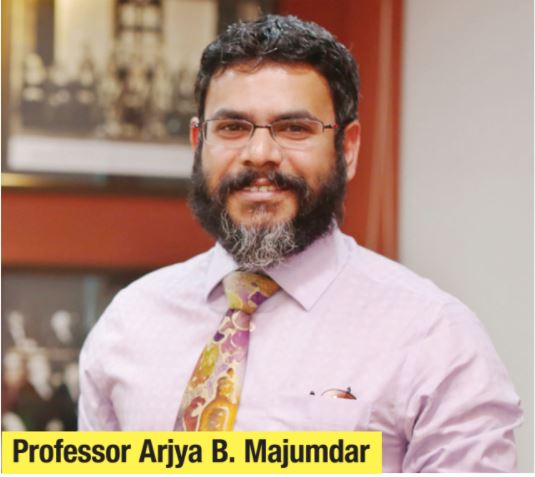

More than a year after the outbreak of the pandemic, nearly half of the students worldwide remain affected by intermittent school closures, according to the United Nations Educational, Scientific and Cultural Organization (UNESCO). The pandemic has severely disrupted lives of university teachers and 38.5 million students enrolled in India’s higher education as well, forcing them to enter into an undefined period of online learning.
A large number of current and prospective international students have suddenly found themselves confined to their homes instead of experiencing the campus life of their dream university. At the same time, as Covid-19 rendered hundreds and thousands of people jobless, the appeal of online courses offered at platforms such as Coursera, FutureLearn and upGrad has substantially increased among those who wish to rebuild their career.
While research on the effects of online classes is still ongoing, the question that everyone has on mind now is this: what form will learning take when normalcy returns and schools and colleges everywhere reopen? The question is particularly pertinent at this juncture when ramping up of the vaccination drive has raised hope of in-person classes at schools, colleges and universities becoming the norm again in the near future.
The probability that a large section of students and working professionals may continue to prefer remote learning in a post[1]pandemic world cannot be denied. There is also a possibility that future in-person classes will integrate the benefits of online tools for various purposes, thereby giving rise to a form of blended learning. How the future will shape up, only time will tell, although the writing on the wall is now clear that digital tools will play a far more important role in our lives than what we could probably imagine just a year ago.
Edtech Boom
In its latest report on an ongoing survey, global higher education analysts Quacquarelli Symonds (QS) said that more than a third of current international students are studying remotely from their home country. It just offers a glimpse of how important a role online technology tools have played in enabling students to receive education amid this crisis.
With a large number of 265 million students enrolled in Indian schools using edtech apps amid the pandemic, investors from around the world have made a beeline to pump their money into such platforms. A stellar example is the rise of Bengaluru-based BYJU’S which became the world’s most highly valued edtech company. At $16.5 billion valuation, BYJU’S recently also wore the crown of India’s most valuable unicorn start-up. Another edtech platform, Unacademy, became a unicorn in 2020.
Overall, Indian edtech startups attracted $2.22 billion investment in 2020 compared to just $553 million in 2019, according to data from Indian Private Equity and Venture Capital Association and PGA Labs. A recent report by analysts at Bernstein estimates that India’s online education market will grow from $1 billion in 2020 to $19.7 billion by 2030.
Challenges of Online Learning
While some research suggests that online learning helps students to retain more information, challenges associated with remote learning are many. In a country like India where more than half of the population are not even active Internet users, online learning puts a vast majority at a great disadvantage. Even those who can get access to online learning face numerous challenges. This is because classroom lessons are not enough for proper personal growth of college students. The environment that a university creates for its students to learn from teachers, peers and other academic, sports and cultural activities cannot be matched by online learning. Skilling educators in new technologies is another challenge that many institutions face.
Digital Transformation of Universities
Despite the challenges associated with online learning, the pandemic has clearly underlined for universities the importance of investments in digital technologies. And few universities have understood it better than O.P. Jindal Global University (JGU). To ensure online education at JGU is at par with global standards of excellence, the university established a new office for Digital Learning and Online Education, besides forming a taskforce, called the PIVOT, JGU’ Planned Intervention in Virtual Learning and Online Teaching. These efforts led to round[1]the-clock technology support for both teachers and students, leading to seamless transition to online classes when the pandemic demanded.
This is the reason why JGU was awarded the coveted QS I-GAUGE ‘E-Learning Excellence for Academic Digitisation (E-LEAD)’ Certification in 2020, further renewed in 2021. In 2020, JGU conducted 20,000 online classes, 1,250 unique online examinations and 1,500 webinars. Moreover, the university quickly transformed its Global Library which now includes thousands of electronic journals, e-books, online reports and other e-learning resources.
In a bid to make its programmes more accessible to working professional and other students in India and around the world, JGU recently partnered with Coursera to launch three Master’s degree programmes — MBA in Business Analytics; M.A. in International Relations, Security and Strategy; and M.A. in Public Policy. Earlier, the university launched LLM in Corporate and Financial Law and MBA in Digital Finance and Banking in partnership with edtech major upGrad. Thus, while the university remains ready to welcome its students to its fabulous campus as soon as the circumstances permit, it is equally committed to providing its students the benefits of latest digital technologies, while also developing world-class online education programmes for those who wish to receive education through virtual mode even in a post pandemic world.
Other articles by Prof Arjya B. Majumdar:
Reimagining Student Evaluation For A Dynamic India
The built environment isn’t pandemic-proof – can the right education change that?
Is Interdisciplinary Learning an Imminent Reality for India?
